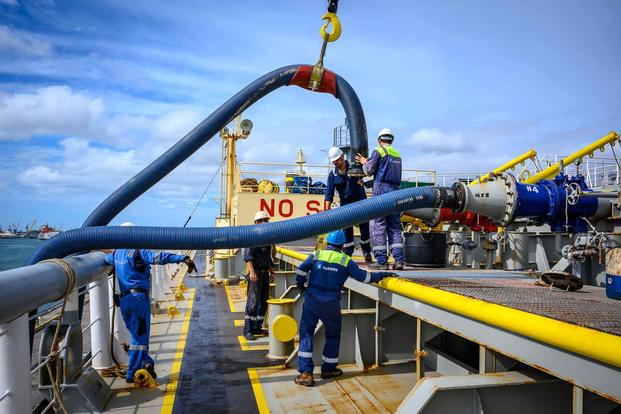The Department of Defense plans to develop a registry for residents of Joint Base Pearl Harbor-Hickam, Hawaii, who consumed water tainted with jet fuel in November 2021 to understand the long-term health impacts, a Defense Health Agency official said Tuesday.
The announcement comes more than two years after 93,000 service members and their families were exposed to the contamination. It is still unknown when the registry will be operational, but work on creating it is expected to start later this year.
Working with the Agency for Toxic Substances and Disease Registry, the Pentagon is building the database and plans to provide a grant to an independent organization, such as a nonprofit or university, to manage the project. Army Col. John Oh, a DHA spokesman, said during an online briefing Tuesday that the grant is expected to be awarded sometime in the summer or fall but couldn't say when residents would be able to sign up.
"I know people want the registry -- like, it should have been operational a year ago. I wish it could have been. The reality though ... is these registries take time," Oh said.
He said the DoD is spending time developing the registry so it can capture and provide valuable data and information on the health effects of fuel consumption for years to come.
More than 90,000 people were exposed to jet fuel in their residences on Oahu in November 2021 after a pipe ruptured at the Red Hill Bulk Fuel Storage Facility in the hills above Pearl Harbor. The accident sent up to 5,000 gallons of fuel into a nearby drinking water well that supplied water to the joint base and elsewhere.
It was later revealed that the fuel was in the pipe as a result of a massive spill in May.
Following the November spill, the Navy issued a statement saying there were "no signs or indication" that fuel had entered the groundwater or soil and the drinking water remained safe.
Dozens of residents complained of the smell and taste, as well as health issues that included rashes, nausea, headaches, nosebleeds and more.
Some continue to complain of continued health problems including gastrointestinal issues and trouble concentrating or focusing on tasks.
Members of Hawaii's congressional delegation have introduced legislation to require the U.S. Department of Health and Human Services to establish a health registry to track those exposed to the spill.
Portions of that legislation, introduced by Sen. Brian Schatz, D-Hawaii, in the Senate and Rep. Ed Case, D-Hawaii, in the House, are included in the fiscal 2024 National Defense Authorization Act, signed into law Dec. 22.
The law requires the DoD to work with the Centers for Disease Control and Prevention and the Department of Veterans Affairs, as well as state and local agencies, to review federal programs and services available to individuals who have been exposed and furnish reports to Congress on the health impact on individuals.
It also mandates a feasibility study by the DoD to determine whether an epidemiological study of the affected population is warranted.
Oh said when the registry is opened, DHA will launch efforts to encourage residents to enroll to aid the agency's ability to study the long-term health impacts of fuel exposure -- of which very little is known in the scientific community.
"We are committed to trying to better understand this," Oh said.
More than 7,000 troops or their family members have filed claims against the government for the exposure under the Federal Tort Claims Act. Hundreds of service members have taken the next step in the process, filing suit for damages they said they incurred as a result of drinking and bathing in the water.
Roughly 80% of families surveyed after the massive spill reported ongoing health problems nearly a year after the exposure, and 79% said they had children who had consumed the water and were still sick.
The surveys did not include all who were exposed, however. The first drew voluntary responses from about 14% of the affected households, while the second was answered by 961 residents.
The incident resulted in the closure of the tank farm and subsequent removal of the fuel stored at the facility.
On Monday, Joint Task Force-Red Hill said it would begin removing 64,000 gallons of remaining residual fuel from the facility beginning Jan. 15 pending approval, after having removed more than 104.6 million gallons via gravity feed to ships for transport and storage in other locations.
The last merchant tanker, Yosemite Trader, left Joint Base Pearl Harbor-Hickam on Dec. 20.
Oh said that, as part of creating the Red Hill health registry, developers have looked closely at the registry designed for residents of Flint, Michigan, nearly 100,000 of whom were exposed for nearly a year to high levels of lead in their drinking water after the city switched water systems in April 2014.
That registry is designed to monitor health, child development, ongoing exposure and utilization of services.
Oh said the timeline for developing the Red Hill registry tracks with the timing of the development of the Flint registry.
"We want to make this registry value-added, thorough and work as quickly as possible to get to there," Oh said. "This Red Hill registry is going to be around for a long time, and I want it to be built to last. I don't want to build some weak house that has a bad foundation and then five years from now we're gonna have buyer's remorse."















